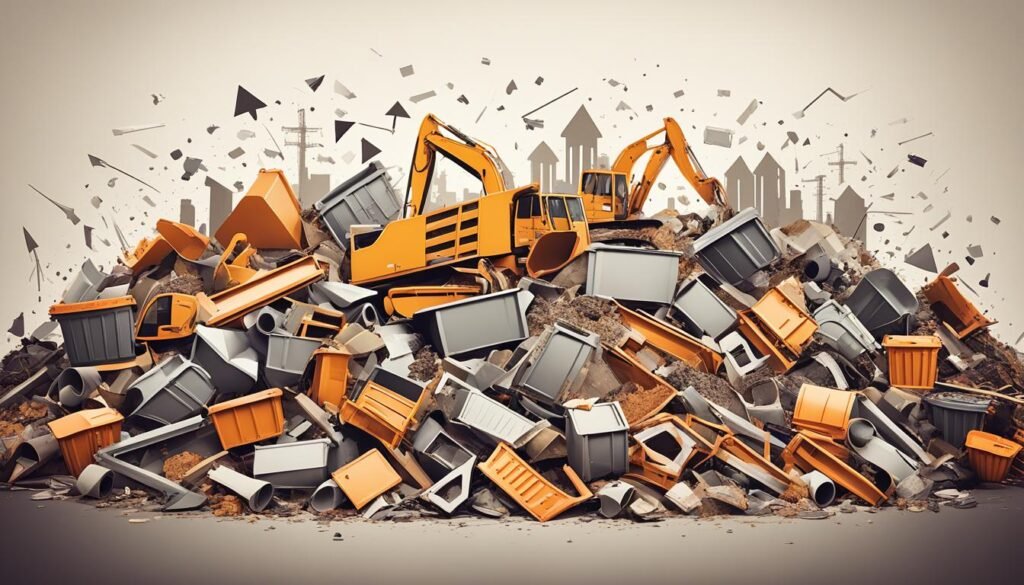Did you know the construction industry in the U.S. makes over 500 million tons of waste yearly? This huge amount of waste is a big problem for our environment. That’s why it’s important for those in construction to manage waste well. This helps them work better and lessens their environmental impact.
Key Takeaways:
- Understanding the types of waste generated on construction sites is vital for effective waste management.
- Creating a waste management plan before starting a project can significantly reduce waste generation.
- Choosing sustainable partners and implementing recycling strategies are key components of efficient waste management.
- Optimizing material usage, reusing materials, and training the team are important aspects of efficient waste management.
- Regularly monitoring and adjusting waste management strategies can enhance waste management practices.
Types of Construction Waste and Proper Disposal Methods
In construction projects, several waste types are produced. These include wood, concrete, metal, and plastic. Handling and getting rid of these materials the right way is key for green building and less harm to the planet.
Wood Waste: Excess materials and demolition often result in wood waste. This doesn’t have to end up in landfills. Instead, you can give it a new life or turn it into energy. Wood can be used in gardens or for making reclaimed wood items. It can also be used for energy in biomass conversion processes.
Concrete Waste: A big part of construction waste is concrete debris. Yet, it’s possible to recycle and reuse it, cutting down the need for new rocks. Crushing concrete turns it into a material that can be used again. This saves resources and cuts waste.
Metal Waste: Construction sites often gather excess metal. Instead of wasting it, we can recycle. Sending metal waste to recycling places helps save Earth’s treasures. It also lowers the energy used and emissions from making new metal.
Plastic Waste: Getting rid of plastic the right way is a must to avoid pollution. Plastic items like packaging need to be separated for recycling. Working with specialized recyclers helps make sure plastic is handled right, lessening its harm on nature.
Hazardous Waste: Things like asbestos, paint, and chemicals from construction sites are dangerous. They can hurt people and the environment, so they need careful disposal. Following the rules and using qualified disposal services is crucial.
Knowing how to properly dispose of each waste type is vital to follow the law. By recycling and reusing, those in construction can help make the industry greener and more planet-friendly.

| Construction Waste Type | Disposal Method |
|---|---|
| Wood Waste | Repurposing for landscaping or energy recovery |
| Concrete Waste | Crushing and reusing as aggregate |
| Metal Waste | Collection and recycling at specialized facilities |
| Plastic Waste | Segregation for recycling with certified waste management companies |
| Hazardous Waste | Special handling and disposal methods by certified services |
Strategies for Effective Construction Waste Management
Before any construction starts, it’s key to have a waste management plan. This plan outlines the handling, reduction, and disposal of waste. It also looks into local disposal laws and facilities. By setting goals for waste reduction and recycling early on, we help keep landfills smaller and make construction more green.
Breaking down waste into recyclables, reusables, and landfillable materials makes disposal easier. Choosing a good waste management company like Local Plumbers 4 U is wise. They assist in recycling and reusing materials, which lowers disposal costs and lessens environmental impact.
Reusing what you can, using reclaimed components, and picking recyclable materials with a lot of recycled content cuts down waste. On-site waste separation efforts, like different bins for various waste types, are important too. Enforcing a detailed waste management plan ensures waste is handled right during construction.
FAQ
Why is construction waste management important?
What are the different types of construction waste?
How should different types of construction waste be disposed of?
What should be included in a waste management plan?
How can construction professionals optimize material usage and reduce waste?
How can partnering with waste management companies like Local Plumbers 4 U help?
Source Links
- https://www.seagulldisposal.com/2024/04/26/construction-site-waste-management-best-practices-for-builders/
- https://www.zerowastedesign.org/02-building-design/fa-construction-demolition-waste-best-practice-strategies/
- https://www.7skipbins.com.au/resources/tips-for-effective-waste-management-on-a-construction-site/
